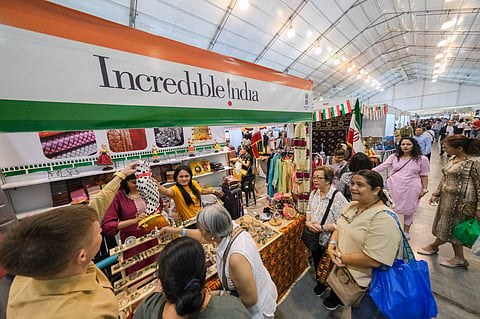
- NEWS
- the EDIT
- COMMENTARY
- BUSINESS
- LIFE
- SHOW
- ACTION
- GLOBAL GOALS
- SNAPS
- DYARYO TIRADA
- MORE

Denmark and several Filipino organizations gathered to amplify calls for better urban planning in the Philippines that would make spaces safer for women.
Danish Ambassador to the Philippines Fran-Michael Mellbin pushed for the Philippines to have more safe spaces for cyclists.
In his presentation, Denmark is a use case for gender equality in active mobility, stressing that the Danish design of spaces is safe for urban cycling.
In a 2023 report by Discerning Cyclist, an urban cycling publication, Denmark ranked second in the highest bicycle usage.
It was noted that, of their more than 5 million population members, 80 percent are cyclists, which translates to 4.5 million bicycles (almost close to their population number).
As a cyclist, he said he goes biking in Metro Manila a lot, mentioning his experience in a road incident.
"I was actually side-swiped twice by cars here," Amb. Mellbin said in a urban planning forum recently in UP Diliman.
"One time by a jeepney, which wanted to pick somebody up, and then—bang!—I was lying there."
"There is no doubt that the number one thing that matters to getting [people, women, especially] onto a bike is safety," he said.
"If you ever travel abroad, there are lots of cities who are doing very well on cycling: New York, Paris, London, Berlin… lots of cities are doing much better today."
Amb. Mellbin pointed out that the Danish biking system is "far from perfect."
While it was generally safe in Denmark, some women were still uncomfortable traveling at night, especially in dark places, borne out of the physical design of transport infrastructure, such as train stations and tunnels.
The official underlined that collaboration is key to making safer spaces, not just for women but for all, saying that "it's not cars versus bikers", and the government "needs a collaborative approach" toward dealing with the problem.
In the end, the ambassador noted that shifting from a car-centric environment to a people-oriented place may be difficult but is possible.
In support of this, Marianne Weinrich, chairman of Denmark's Cycling Embassy, also highlighted that men and women do not experience the same in transport and mobility, saying that when traveling, women tend to consider more factors than men, specifically the route to take, in fear of harassment, noting that the designs of streets and places influence their feelings of safety and security.
In line with this, among her recommendations is to include the collection and analysis of gender-segregated data in planning and design; implement specific and targeted measures to accommodate and include women on all levels in the transport sector; and not victimize women but include safety and security in the design of the solutions.
Ann Angala of Break the Cycle Philippines also pushes for a safer biking culture in the country, stressing that the Philippines is not a safe biker country.
"It's not really safe to bike here in the Philippines despite all the dedicated lanes and thousands of kilometers that we proudly say that we have; it's not enough," she said.
The cycling enthusiast also expressed sentiments about pedestrian lanes, saying, "in an ideal situation, we really don't need [ped-xing]."
"The real culture that we have in urban planning will be pedestrian priority. We're given space and accessibility to crosswalk without fearing for our lives; we don't have to go up two floors to cross and then go down when it's simpler to cross the street," she added.
Among her suggestions is to provide roads and promote bikes as a main means of travel rather than using cars. She also called for the construction of protected bike lanes, safe parking, and ramps.
On the other hand, Professor Sheila Napalang from the UP SURP underscored that not only women experience unsolicited sexual behaviors in the country's public transport system but also members of the LGBT community.
She proposed providing inclusive safe spaces through transportation, such as having good lighting in waiting areas, having women-only public transportation, and having well-lit and surveilled places, especially at night.
